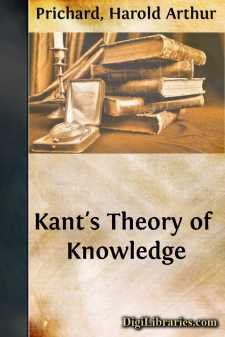Categories
- Antiques & Collectibles 13
- Architecture 36
- Art 48
- Bibles 22
- Biography & Autobiography 813
- Body, Mind & Spirit 142
- Business & Economics 28
- Children's Books 17
- Children's Fiction 14
- Computers 4
- Cooking 94
- Crafts & Hobbies 4
- Drama 346
- Education 46
- Family & Relationships 57
- Fiction 11829
- Games 19
- Gardening 17
- Health & Fitness 34
- History 1377
- House & Home 1
- Humor 147
- Juvenile Fiction 1873
- Juvenile Nonfiction 202
- Language Arts & Disciplines 88
- Law 16
- Literary Collections 686
- Literary Criticism 179
- Mathematics 13
- Medical 41
- Music 40
- Nature 179
- Non-Classifiable 1768
- Performing Arts 7
- Periodicals 1453
- Philosophy 64
- Photography 2
- Poetry 896
- Political Science 203
- Psychology 42
- Reference 154
- Religion 513
- Science 126
- Self-Help 84
- Social Science 81
- Sports & Recreation 34
- Study Aids 3
- Technology & Engineering 59
- Transportation 23
- Travel 463
- True Crime 29
Kant's Theory of Knowledge
Description:
Excerpt
CHAPTER I
THE PROBLEM OF THE CRITIQUE
The problem of the Critique may be stated in outline and approximately in Kant's own words as follows.
Human reason is called upon to consider certain questions, which it cannot decline, as they are presented by its own nature, but which it cannot answer. These questions relate to God, freedom of the will, and immortality. And the name for the subject which has to deal with these questions is metaphysics. At one time metaphysics was regarded as the queen of all the sciences, and the importance of its aim justified the title. At first the subject, propounding as it did a dogmatic system, exercised a despotic sway. But its subsequent failure brought it into disrepute. It has constantly been compelled to retrace its steps; there has been fundamental disagreement among philosophers, and no philosopher has successfully refuted his critics. Consequently the current attitude to the subject is one of weariness and indifference. Yet humanity cannot really be indifferent to such problems; even those who profess indifference inevitably make metaphysical assertions; and the current attitude is a sign not of levity but of a refusal to put up with the illusory knowledge offered by contemporary philosophy. Now the objects of metaphysics, God, freedom, and immortality, are not objects of experience in the sense in which a tree or a stone is an object of experience. Hence our views about them cannot be due to experience; they must somehow be apprehended by pure reason, i. e. by thinking and without appeal to experience. Moreover, it is in fact by thinking that men have always tried to solve the problems concerning God, freedom, and immortality. What, then, is the cause of the unsatisfactory treatment of these problems and men's consequent indifference? It must, in some way, lie in a failure to attain the sure scientific method, and really consists in the neglect of an inquiry which should be a preliminary to all others in metaphysics. Men ought to have begun with a critical investigation of pure reason itself. Reason should have examined its own nature, to ascertain in general the extent to which it is capable of attaining knowledge without the aid of experience. This examination will decide whether reason is able to deal with the problems of God, freedom, and immortality at all; and without it no discussion of these problems will have a solid foundation. It is this preliminary investigation which the Critique of Pure Reason proposes to undertake. Its aim is to answer the question, 'How far can reason go, without the material presented and the aid furnished by experience?' and the result furnishes the solution, or at least the key to the solution, of all metaphysical problems.
Kant's problem, then, is similar to Locke's. Locke states that his purpose is to inquire into the original, certainty, and extent of human knowledge; and he says, "If, by this inquiry into the nature of the understanding I can discover the powers thereof; how far they reach, to what things they are in any degree proportionate, and where they fail us; I suppose it may be of use to prevail with the busy mind of man, to be more cautious in meddling with things exceeding its comprehension; to stop when it is at the utmost extent of its tether; and to sit down in a quiet ignorance of those things, which, upon examination, are found to be beyond the reach of our capacities." Thus, to use Dr. Caird's analogy, the task which both Locke and Kant set themselves resembled that of investigating a telescope, before turning it upon the stars, to determine its competence for the work.
The above outline of Kant's problem is of course only an outline. Its definite formulation is expressed in the well-known question, 'How are a priori synthetic judgements possible?' To determine the meaning of this question it is necessary to begin with some consideration of the terms 'a priori' and 'synthetic'.
While there is no difficulty in determining what Kant would have recognized as an a priori judgement, there is difficulty in determining what he meant by calling such a judgement a priori. The general account is given in the first two sections of the Introduction. An a priori judgement is introduced as something opposed to an a posteriori judgement, or a judgement which has its source in experience. Instances of the latter would be 'This body is heavy', and 'This body is hot'. The point of the word 'experience' is that there is direct apprehension of some individual, e....


